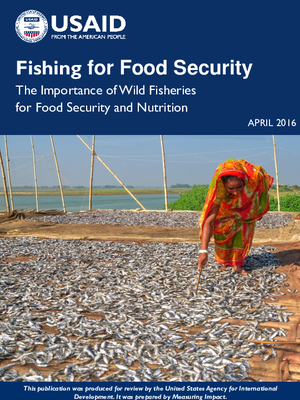Fishing for Food Security: The Importance of Wild Fisheries for Food Security and Nutrition

The Importance of Wild Fisheries for Local Food Security Briefing Book explores the role of fisheries in global development, showcases case studies of USAID fisheries programs, and addresses the importance of fisheries in nine Feed the Future countries – Cambodia, Senegal, Malawi, Kenya, Ghana, Bangladesh, Tanzania, Mozambique, and Liberia. The Briefing Book is a key deliverable of the Food Security Integration Working Group.
USAID is pleased to announce the release of the “Fishing for Food Security: The Importance of Wild Fisheries for Food Security and Nutrition” Briefing Book. This valuable resource explores the role of wild fisheries in global development, showcases several USAID fisheries programs, and highlights the importance of fisheries in nine Feed the Future countries: Bangladesh, Cambodia, Ghana, Kenya, Liberia, Malawi, Mozambique, Senegal, Tanzania. A product of USAID Forestry and Biodiversity Office's Food Security Integration Working Group, the Briefing Book is available on USAID’s Development Experience Clearinghouse:
View Online:
Related Information
In-depth country profiles are available on the Importance of Wild Fisheries to Local Food Security in Bangladesh, Cambodia, Ghana, Kenya, Liberia, Malawi, Mozambique, Senegal and Tanzania. The PDFs are available on USAID’s Development Experience Clearinghouse at https://DEC.USAID.gov, and USAID’s Biodiversity Conservation Gateway at https://rmportal.net/biodiversityconservation-gateway/resources/projects/measuring-impact.
Sustainable management of wild fisheries, especially small-scale fisheries, is critical for achieving food security and poverty reduction in many developing countries, including many Feed the Future countries. Fish are the world’s most widely trade food products, as well as some of the most nutritious, yet are often overlooked in international and national food security discussions and action plans. New research estimates that the global catch from wild fish is 50% higher than previously reported, further highlighting the importance of wild fish in local and global food security.
Modern management approaches can sustainably increase wild fish production, reduce poverty and enhance community resilience to climate change. Effective approaches may include co-management arrangements, secure tenure, fishery reserves and ecosystem-based management. There is growing interest in improving wild fisheries management not only by the public sector, but also by the private sector, as modern management approaches demonstrate their effectiveness in restoring and enhancing fish populations.


